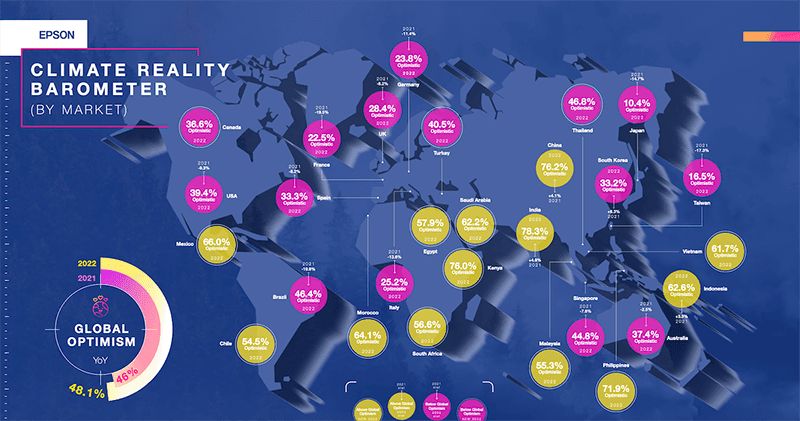.gif)
Epson conducted research that showed that a lot of people across the globe consider climate change as the primary threat to our existence. |
| Epson shares the Climate Reality Barometer research |
Epson's research shows the global threat of climate change
 |
| Here are some of the found data |
Despite growing climate consequences, a survey of 26,205 people in 28 markets finds that confidence about the future of the climate has risen to almost 48 percent. Global awareness of climate change encourages people to adopt more eco-friendly lives.
The most recent results from Epson's second Climate Reality Barometer show that a lot of people are increasing their individual efforts to stop climate change. The world economy may serve as a diversion from efforts to address climate concerns, but according to research from the global technology giant, climate change continues to be a top priority for many people.
The survey also shows that individuals are becoming more confident that a catastrophic climate event may be avoided within their lifetime, despite a year of exceptional climate impacts. However, data also reveals that there are large disparities in confidence levels, influenced by things like age and economics.
Unsurprisingly, people's top concerns are immediate financial problems. While "fixing the economy" (22 percent) and "increasing prices" (21 percent) are the top two issues on respondents' priority lists, climate change (20 percent) is a very close third. The global climate catastrophe continues to be a top concern for many people despite the declining global economy, armed conflicts, and rising energy costs.
But worries about the climate aren't making people more pessimistic. 46 percent of respondents from around the world said that a climate disaster could be avoided during a lifetime prior to COP 26 in November 2021.
Optimism has increased to almost 48 percent as the world gets ready for COP27 in Egypt this year. This is despite the effects of climate change that have been seen over the past year, suggesting a "reality gap" in which people may not fully appreciate the long-term effects of climate change on the planet. The Philippines is one of the countries with the highest climate optimism significantly at 71.9 percent.
Findings also point to the influence of age, with the oldest and youngest age groups expressing the greatest anxiety about climate change. The only age group to rank climate change as the most urgent global issue is 55 and over (22.2 percent), followed by the 16 to 24 age group (19.3 percent), with all other age groups placing it third.
Growing optimism worldwide seems to be at odds with the state of the climate. "Human-induced climate change is creating dangerous and pervasive upheaval in nature and harming the lives of billions of people throughout the world," the Intergovernmental Panel on Climate Change (IPCC) stated in 2022.
Disruption has resulted in unseasonably warm temperatures across the entirety of Europe, decades-long "mega-droughts" in Africa and South America, rapid warming of the Arctic and Antarctic, deadly floods in Asia and Australasia, disappearing lakes in North America, and adverse climate events on every continent just this year.
Unchecked optimism may be viewed as wishful thinking, but Epson's findings demonstrate that respondents are aware of the effects of climate change. The evidence from one's own eyes, which includes observing climate change in one's daily life, is cited by more than eight out of ten people as the most important component in raising awareness.
In turn, in 2022, climate optimism also lead to more people taking action to battle climate change. More people are now choosing to walk or cycle around, more people are choosing to use renewable energy, unnecessary leisure/business travel is now reduced, electric vehicle usage is now more popular, and a plant-based diet is now more adapted.
Even though individual efforts are increasing, it is obvious that much more needs to be done. If the world is to reach its climate change targets and avert irreversible damage, governments must regulate for sustainability, corporations must develop sustainable policies and technologies, and individuals must hasten lifestyle adjustments.
What do you guys think?

.gif)


.gif)




Post a Comment